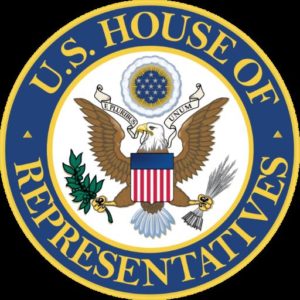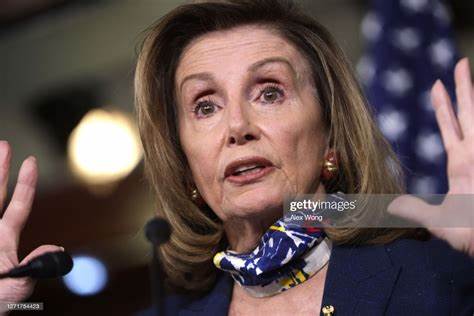PHOTO: US House Speaker, Nancy Pelosi
In their Resolution to mark Liberia’s bicentennial celebrations, the United States House of Representatives has issued a resolution reaffirming their commitment to support progress towards good governance in Liberia, tracing the longstanding historical ties between the two countries.
Below is the full text of the Resolution:
117TH CONGRESS 2D SESSION H. RES. 907

Reaffirming our commitment to support progress toward transparency, accountable institutions, and other tenets of good governance in the Republic of Liberia as it approaches the bicentennial of the arrival of the first free Black Americans to Providence Island, Liberia.
IN THE HOUSE OF REPRESENTATIVES FEBRUARY 4, 2022
Mr. MEEKS (for himself, Ms. BASS, Mr. MCCAUL, and Mr. SMITH of New Jersey) submitted the following resolution; which was referred to the Committee on Foreign Affairs.
RESOLUTION
Reaffirming our commitment to support progress toward transparency, accountable institutions, and other tenets of good governance in the Republic of Liberia as it approaches the bicentennial of the arrival of the first free Black Americans to Providence Island, Liberia.
Whereas, on January 7, 1822, free Black Americans arrived in present-day Liberia through the efforts of the American Society for Colonizing the Free People of Color of the United States, also known as the American Colonization Society, established in 1816 to fund the passage of free Black Americans to West Africa;
Whereas, in 1847, the free Black Americans declared independence from the American Colonization Society and founded the Republic of Liberia, the first independent African republic, and established diplomatic relations with the United States in 1864 that have endured for more than 150 years;
Whereas United States interests in Liberia’s natural resources and Liberia’s strategic location in West Africa resulted in enhanced bilateral cooperation with the United States and prompted the United States and Liberia to sign a defense cooperation agreement in 1942 and subsequent agreements that facilitated strategic infrastructure development in Monrovia and enhanced United States-Liberia defense cooperation thereafter;
Whereas, in 1944, Liberia declared war against Germany and Japan, further reinforcing Liberia’s commitment to support the United States and the Allies in World War II;
Whereas, from 1980 to 2003, Liberia’s democracy was undermined by a coup d’état, corruption, mass atrocities such as rape, torture, and forced disappearances, and two civil
wars that left at least 250,000 people dead, tens of thousands maimed, hundreds of thousands displaced, and thousands of former child soldiers seeking rehabilitation
and reintegration for physical and mental trauma;
Whereas Liberia, with United States support for democracy, governance, and anticorruption initiatives, emerged from decades of civil war in 2003 and worked to rehabilitate the democratic process through successive free and fair elections ever since;
Whereas, in 2016, the United Nations Security Council voted to end sanctions and an arms embargo on Liberia, citing substantial progress on post-conflict stabilization;
Whereas the United States acknowledges ongoing efforts to address government corruption and other critical reforms in Liberia and will continue to work with the Liberian Government to advance the objectives of the Liberian Anti-Corruption Commission and other anti corruption agencies and goals underpinning Liberia’s participation in the Summit for Democracies in December 2021;
Whereas the United States remains the largest and longest bilateral donor to the Republic of Liberia, allocating more than $3,000,000,000 in multiagency assistance since 2003 to support stabilization, economic recovery, development, and global health, including support for Liberia’s response to the 2014–2016 Ebola outbreak and the ongoing COVID–19 pandemic, during which the United States has worked with partners to donate nearly
900,000 COVID–19 vaccine doses;
Whereas the United States has demonstrated its commitment to bolster bilateral relations through continued sessions of the U.S.-Liberia Partnership Dialogue, Liberia’s ongoing
participation in the House Democracy Partnership, and related initiatives;
Whereas Liberia remains a beneficiary of United States trade preferences through the African Growth and Opportunity Act and the 2007 Trade and Investment Framework Agreement, both of which affirm the importance of open and diversified trade and investment between the United States and Liberia; and
Whereas the Liberian people and the Liberian diaspora have contributed significantly to the United States and Liberia and reaffirm the longstanding transatlantic ties between the two nations, which will be underscored by the Republic of Liberia’s bicentennial celebration:
Now, therefore, be it Resolved, That the House of Representatives—
(1) remains committed to nurturing the enduring ties between the people and the Governments of the United States and Liberia, including through the provision of United States support for a strong civil society, reputable and accountable institutions, transparency, and other tenets of good governance that should help lay a solid foundation for Presidential elections in 2023;
(2) encourages Liberia to redouble its efforts to 11 counter corruption, advance the causes of human rights, and implement critical economic reforms necessary to accelerate sustainable economic growth and human capital development;
(3) calls on the Departments of State and the 16 Treasury to continue to impose targeted sanctions and other measures against those responsible for undermining the rule of law as well as the faith and trust of the Liberian people through the conduct of corruption, gross violations of human rights, and other acts that threaten the peace and security of Liberia;
(4) recalls the historical significance of Liberia’s bicentennial anniversary as the country continues to build a vibrant and inclusive democracy; and supports the continuing efforts of the Liberian diaspora in the United States and their substantial contributions to robust transatlantic dialogue, engagement, and transformational initiatives that advance democratic principles in Liberia.
Source: U.S. Government Publishing Office

